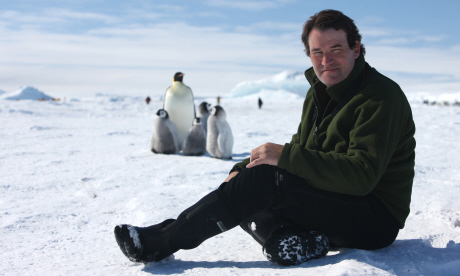
Executive producer of upcoming wildlife documentary Frozen Planet chats to Wanderlust about why you simply cannot miss the show
I bet you can't wait for the series to be broadcast?
I'm very excited. My series take a very, very long time to make and it's been a long wait. We finished Planet Earth in 2006 and we started slow preparations for Frozen Planet in 2007, so it’s been four years in the making and I’m very, very pleased with it.
The programme is an investment and it’s a timely 100th anniversary of Scott and Amundsen reaching the South Pole and I’m really pleased to have made it now. When we started there were lots of reports about how the Polar regions were changing and we saw that. There is no doubt that, I’m not saying this is the last chance to see them, but I don’t think anyone will raise the funds that we have raised to work in the Polar regions at this high quality again for a very, very long time. And when they do, the Arctic in particular, will have changed.
Why does it take so long for a series like this to come together?
It takes about a year of really good research, which involves talking to every scientist on the planet, trying to find really new stories. In the polar regions, where the scenery is amazing and the animal spectacles extraordinary, the variety of species in the polar regions is effectively limited, so when we say 'let’s find new behaviour, let’s show people new things,' you really are pushing the boundaries further than people have ever done before and you really do a lot of work just to be sure about that.
Also, we work on lots of technical developments. To give you an example, when we made Planet Earth, we developed a special camera that could shoot film from a helicopter and still stabilise a very powerful lens. This was significant because it allowed us, for the very first time, to film complete behavioural experiences from the air.
Previously, you couldn’t do that – to fly low enough to get a close up you’d frighten the animals.
One of the big technological breakthroughs with Frozen Planet was to take this idea and mount it onto a boat. This was relevant because we knew that a lot of the seas in the southern oceans and in the Arctic are very rough and to film some of the behaviour and use a long lens we had to find a way to stabilise that lens on a ship rather than on a helicopter. So a good year of preparation is needed.
Another thing is, I always go for an absolute minimum of two years (and ideally three years), of filming. That’s because you need to experience each season twice – two Arctic summers, two Antarctic summers. Often we’ll try a sequence and we’ll get half of it and then we’ll go back. The reason for that is we want to get every angle – to get the whole story.
It very quickly ends up as being five years in total.
How does it feel to work on a project for such a long time? Especially as it is only shown on the TV for such a short amount of time?
It’s funny – it is a very long time when you come to the end and you think, “Oh my God. When I started this I was quite a bit younger than I am now.” But when you’re working on it, it seems like such a desperate rush. You’re hitting deadline after deadline after deadline – the polar bear cubs only emerge at the beginning of April so you have to be ready for that time. It always feels very busy as we go along.
What is nice about being fortunate enough to make these big landmark series like Blue Planet and Planet Earth is that, yes they are only broadcast once, but actually what is really pleasurable is the DVD.
"No sex or drugs, just jolly cold!" says Arctic Bruce Parry | Interviews... More
The World According to Frozen Planet, series producer Vanessa Berlowitz... More
How eight 'extraordinary' women conquered the South Pole | Interviews... More
Check out the brief World According to Sir David Attenborough | Interviews... More
Want more polar inspiration? Check out our travel guide to the regions... More